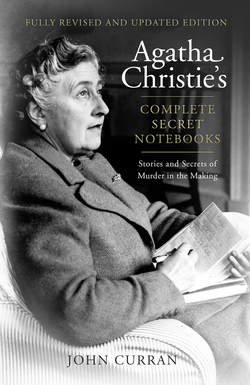Читать книгу Agatha Christie’s Complete Secret Notebooks - Агата Кристи, Agatha Christie, Detection Club The - Страница 18
Fairness
ОглавлениеThroughout her career Christie was quite happy to provide her readers with clues, confident in the knowledge that, in the words of her great contemporary R. Austin Freeman, ‘the reader would mislead himself’. How many readers will properly interpret the clue of the calendar in Hercule Poirot’s Christmas, or the velvet stole in Death on the Nile, or the love letters in Peril at End House? Or who will correctly appreciate the significance of the wax flowers in After the Funeral, or Major Palgrave’s glass eye in A Caribbean Mystery, or the telephone call in Lord Edgware Dies, or the beer bottle in Five Little Pigs?
While not in the same class of ‘surprise solution’ as Murder on the Orient Express, The Murder of Roger Ackroyd or Crooked House, the solution to The Mysterious Affair at Styles still manages to surprise. This is due to the use of one of Christie’s most effective ploys: the double-bluff. It is the first example in her work of this powerful weapon in the detective-story writer’s armoury. Here the most obvious solution, despite an initial appearance of impossibility, transpires to be the correct one after all. In An Autobiography she explains that ‘The whole point of a good detective story was that it must be somebody obvious but at the same time for some reason, you would then find that it was not obvious, that he could not possibly have done it. Though really, of course, he had done it.’ She returned throughout her career to this type of solution; and particularly when the explanation revolves around a murderous alliance: The Murder at the Vicarage, Evil under the Sun, Death on the Nile. Lethal partnerships aside, Lord Edgware Dies and The Hollow also feature this device. And she can take the bluff one step further, in Ordeal by Innocence and, devastatingly, in Witness for the Prosecution.
In The Mysterious Affair at Styles we are satisfied that Alfred Inglethorp is both too obvious and too dislikeable to be the murderer; and, on a more mundane level, he was absent from the house on the night of his wife’s death. So we discount him. As a further strengthening of the double-bluff, part of his plan depends on being suspected, arrested, tried and acquitted, thus ensuring his perpetual freedom. Unless carefully handled this solution runs the risk of producing an anticlimax. Here it is skilfully avoided by uncovering the presence of an unexpected conspirator in the person of hearty Evelyn Howard, who, throughout the novel, has denounced her employer’s husband (her unsuspected lover) as a fortune hunter – as indeed he is.
